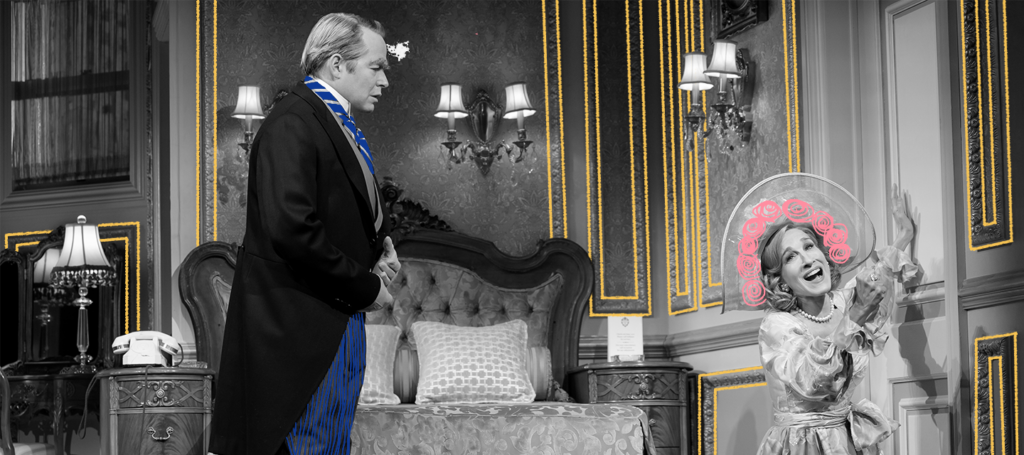


An Evening Spent at Home Beats a Night at this “Plaza Suite”
What does it say about our society that Plaza Suite, the first Neil Simon play to return to Broadway in over 11 years, and the first since his death in 2018, is a middling affair buried in milquetoast acting with inept direction?
During his heyday, Simon defined what Broadway comedy meant. Nicknamed “Doc,” for his frequent work in fixing other shows, Simon helped reinforce the vibrancy of Jewish humor and comedic timing to modern audiences as part of an astonishing run that began with his first major hit in 1962, Barefoot in the Park, all the way to 1994 with Laughter on the 23rd Floor.
For over three decades, there was always a Simon play or musical running on Broadway, with numerous revivals and premieres playing concurrently. In fact, up until his final production, the 2010 revival of Promises, Promises, during his lifetime, a Simon show was never away from Broadway for more than three years at a time.
And now for the first time since it premiered over 53 years ago, thanks to capitalism, audiences have the opportunity to gawk at a mismatched star couple flail through a production of Plaza Suite that no one asked for.
Lest I incur the wrath of Sarah Jessica Parker fans, allow me to qualify that she is fine, though miscast, in this debacle. Additionally, John Lee Beatty’s sumptuous scenic design actually looks as if it has been ripped from a 1960s look-book about The Plaza Hotel. Parker is fine and Beatty’s set is even better; the issues are Parker’s on-stage partner, Matthew Broderick, as well as the fact that Plaza Suite―a dated three-act piece that reads like the white prototype of one of Tyler Perry’s Madea shows―has been revived at all.
Though limited in scope, the original production of Plaza Suite worked because it fed white audiences what they expected and what they thought about themselves through a loving, though paternalistic, lens. It helped that it had Mike Nichols as its director and starred George C. Scott and Maureen Stapleton. Not to mention, the allure that Simon was packing in 1968.
Plaza Suite consists of three underdeveloped skits written in a mannered style that makes a dismal Saturday Night Live episode look like high art. Each of these acts takes place in suite 719 of the Plaza Hotel in New York City and features a man and a woman flailing around a specific issue.
The first, “Visitor From Mamaroneck,” follows Karen (Parker), who has booked the suite to celebrate her wedding anniversary in an attempt to rekindle the spark with her philandering husband. Parker is as fizzy as ever as she sighs wistfully and attempts to ingratiate herself with everyone around her.
Unfortunately, she does not have a handle on Karen’s decidedly Jewish passive-aggressive matronly affect, or the impulse to suffer in silence rather than lash out. Karen constantly gets dates and numerical figures wrong, though one gathers that she lets on more than she reveals and uses her dopy veneer to lure others into traps. Parker, wrongly, plays her as a naif without a conniving bone in her body. Doing so defangs the action and asks us to feel sorry for her rather than to relish in her flaws.
Her husband, Sam, is played by Leo Bloom, I’m sorry, Broderick, using the same nebbish voice and milquetoast affect he’s been milking since he starred in The Producers, two decades ago. Though his co-star in that particular production, Nathan Lane, took that year’s Tony Award for Best Actor, Broderick has decided that walking through performances in the same wan manner is a winning ticket.
But perhaps Broderick isn’t performing; more likely, he is consistently being himself, which is the most offensive aspect of watching him phone it in. Rather than do something―anything―else, he coasts on his early success as a smug Tony Award winner cum Ferris Bueller, whether he is playing Sam or anyone else. If his schtick elevated the show, as Pamela Anderson’s surely will in the musical Chicago, I’d smile at the beneficial pairing. Unfortunately, it’s a wash-out.
Director, John Benjamin Hickey, further dooms the evening by allowing the action to slither at a snail’s pace. The maxim “louder, faster, funnier,” was all but created for Neil Simon’s shows as was the understanding that one “plays a comedy like a tragedy and a tragedy like a comedy.” Rather than embrace Simon’s uncanny ear for rhythmic hilarity, Hickey allows Broderick’s flaccid readings to torpedo all sense of narrative drive.
In lieu of vision, Hickey peppers the remaining acts with slapstick and dopey mannerism that render the characters into caricatures. In Act II’s “Visitor from Hollywood,” Broderick plays Jessie, a horny movie producer who escaped the suburbs but has returned home to put the moves on Muriel, his movie star obsessed, now married, ex-girlfriend. Parker has fun with Muriel’s “I shouldn’t but I probably will” demeanor, while Broderick lumbers around with the same general reading that he gave in Act I and will repeat in Act III.
That closer, “Visitor from Forest Hills”, gives Parker her greatest opportunity to show off her physical comedy skills as the exacerbated mother of a bride who has gotten cold feet and locked herself in the bathroom. Parker hits all the right marks, and if this were a TV production with close-ups and numerous angles, she’d certainly score; unfortunately, on a Broadway stage she looks like a tiny boat lost flailing among the waves. Broderick plays the father of the impatient bride who tries to bash the door down and get her to come out. Nothing he does works; neither the actor nor the character.
The sequence is supposed to be funny and the audience certainly guffawed, most probably because they could hear where the punch lines weren’t landing. That and because each ticket cost $300 on average, leaving one with the choice to either enjoy the emperor’s new clothes or gnash their teeth in despair. It helped that the Hudson Theatre has re-opened its bar, meaning that nearly every person around me comfortably gulped down glasses of wine and champagne without their masks on (despite the ongoing pandemic) throughout the 2 hours and 40 minutes-long ordeal.
Despite my boredom and perhaps because of their inebriation, the audience gave the show an undeserved standing ovation. It must be said that if this is what it means for Broadway to be back, I’d rather stay at home.
Keep Reading

‘Confederates’ Mightily Walks Down the Elusive Road to Freedom
Time sways back and forth like a Newton’s Cradle in Dominique Morisseau’s new biting comedy Confederates, where the differences between understanding, or experiencing racism from a historical, intellectual context, and being confronted with it in a visceral way, become stark clear. The play tackles the subject of slavery in the raw, as well as its […]
Read More
A Need for Black Criticism As Black Art Rises in Theater
Attending theater press performances has made me extremely aware of the lack of diversity in dramatic criticism. Every time I arrive at a show on or off-Broadway for a press evening, I scan the room like clockwork, looking for the other critics I am lucky enough to be in attendance with. Since the reopening of […]
Read More












